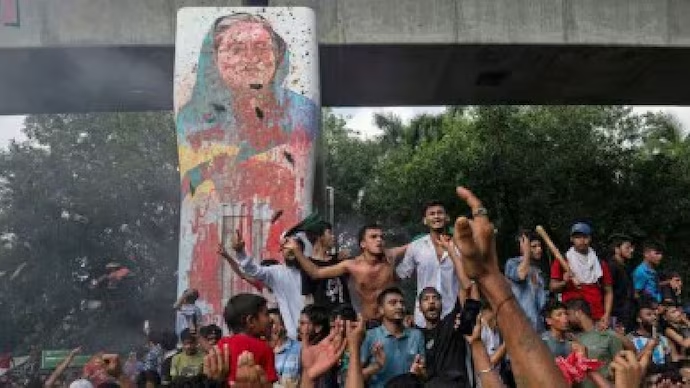
Indian Political Reactions to the Bangladesh Crisis
Background
The ongoing crisis in Bangladesh, marked by violence against the Hindu community and the flight of Prime Minister Sheikh Hasina to India, has elicited varied responses from Indian political parties. The situation has underscored issues related to minority rights and regional stability, leading to diverse reactions from Indian political figures and parties.
Table of Contents
Congress Party’s Measured Response
- Diplomatic Concerns:
- The Indian National Congress, traditionally known for its measured and diplomatic approach, has expressed concern over the violence in Bangladesh. The party has emphasized the need for a peaceful resolution and called for the protection of minority communities.
- Congress leaders have urged the Indian government to engage diplomatically with the Bangladeshi authorities to address the crisis and ensure the safety of affected communities. They have also highlighted the importance of maintaining strong bilateral relations between India and Bangladesh.
- Humanitarian Focus:
- The Congress Party has focused on the humanitarian aspects of the crisis, calling for international support and intervention to address the needs of the displaced and affected individuals. They have advocated for a coordinated response to the crisis and have pushed for efforts to prevent further escalation.
- Public Statements:
- Public statements from Congress leaders have been measured, reflecting a commitment to diplomacy and dialogue. The party has avoided overly confrontational rhetoric and has instead called for a balanced approach to addressing the crisis.
BJP’s Emphasis on ‘Threat to Hindus’
- Security and Protection:
- The Bharatiya Janata Party (BJP), which often focuses on national security and cultural issues, has framed the crisis as a threat to Hindus. The party has highlighted the violence against the Hindu community in Bangladesh and has called for immediate action to protect religious minorities.
- BJP leaders have emphasized the need for a strong response to safeguard Hindus and ensure their security. They have criticized the Bangladeshi government for failing to protect its minority communities and have called for international pressure to address the situation.
- Political Messaging:
- The BJP’s response has been marked by a focus on the cultural and religious dimensions of the crisis. The party has used the situation to underscore its commitment to defending Hindu interests and has portrayed the violence as a reflection of broader regional instability.
- BJP leaders have leveraged the crisis to appeal to their base and to highlight their party’s dedication to protecting Hindu communities both within India and abroad.
- Government Actions:
- In response to the crisis, the BJP-led Indian government has taken steps to address the situation, including providing support to affected communities and engaging with international partners. The government has also used diplomatic channels to address concerns and to push for action on the global stage.

RSS’s Focus on Cultural and Religious Threats
- Advocacy for Hindus:
- The Rashtriya Swayamsevak Sangh (RSS), a prominent Hindu nationalist organization, has been vocal in its condemnation of the attacks on Hindus in Bangladesh. The RSS has framed the crisis as a significant threat to Hindu culture and has called for robust action to protect Hindu interests.
- The organization has mobilized support and organized events to raise awareness about the violence and to advocate for the rights of Hindus. The RSS has emphasized the need for a strong stand against persecution and has urged the Indian government to take decisive action.
- Cultural Rhetoric:
- The RSS’s rhetoric has focused on the cultural and religious dimensions of the crisis, emphasizing the need to defend Hindu identity and values. The organization has used the situation to reinforce its narrative about the importance of safeguarding Hindu culture and addressing threats to religious communities.
- Engagement with Government:
- The RSS has engaged with the Indian government to push for a more assertive response to the crisis. The organization has sought to influence policy and to ensure that the concerns of the Hindu community are addressed effectively.
Comparative Analysis
- Approaches to Diplomacy and Security:
- The Congress Party’s approach has been characterized by a focus on diplomacy and humanitarian concerns, reflecting its commitment to a balanced and measured response. The party has emphasized the need for international cooperation and dialogue.
- In contrast, the BJP and RSS have framed the crisis in terms of religious and cultural threats, highlighting their focus on protecting Hindu interests and addressing security concerns. The BJP has utilized the crisis to reinforce its political messaging, while the RSS has focused on mobilizing support and advocating for Hindu rights.
- Political Implications:
- The different responses from Indian political parties reflect broader ideological and strategic differences. The Congress Party’s emphasis on diplomacy contrasts with the BJP and RSS’s focus on cultural and religious issues, showcasing the varied approaches to addressing regional crises.
- Public and International Perception:
- The reactions of Indian political parties have influenced public perception and international responses to the crisis. The Congress Party’s diplomatic stance may contribute to a more nuanced understanding of the situation, while the BJP and RSS’s focus on Hindu protection highlights the religious dimensions of the crisis.
Conclusion
The crisis in Bangladesh has elicited diverse reactions from Indian political parties, reflecting a range of priorities and perspectives. While the Congress Party has emphasized diplomacy and humanitarian concerns, the BJP and RSS have focused on religious and cultural aspects, highlighting their commitment to protecting Hindu interests. The varied responses underscore the complexity of the situation and the differing approaches to addressing regional crises.







